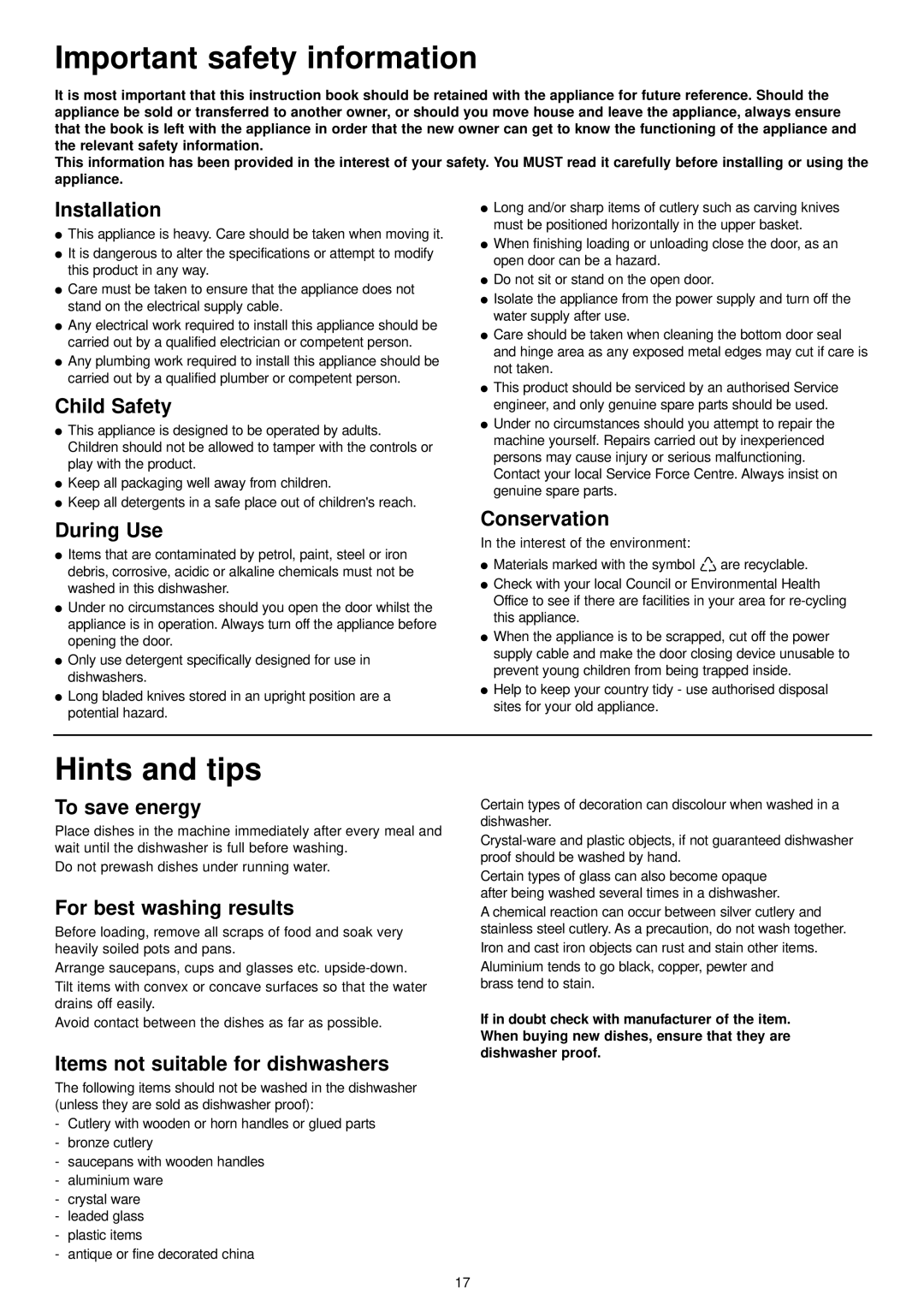
Important safety information
It is most important that this instruction book should be retained with the appliance for future reference. Should the appliance be sold or transferred to another owner, or should you move house and leave the appliance, always ensure
that the book is left with the appliance in order that the new owner can get to know the functioning of the appliance and the relevant safety information.
This information has been provided in the interest of your safety. You MUST read it carefully before installing or using the appliance.
Installation
●This appliance is heavy. Care should be taken when moving it.
●It is dangerous to alter the specifications or attempt to modify this product in any way.
●Care must be taken to ensure that the appliance does not stand on the electrical supply cable.
●Any electrical work required to install this appliance should be carried out by a qualified electrician or competent person.
●Any plumbing work required to install this appliance should be carried out by a qualified plumber or competent person.
Child Safety
●This appliance is designed to be operated by adults.
Children should not be allowed to tamper with the controls or play with the product.
●Keep all packaging well away from children.
●Keep all detergents in a safe place out of children's reach.
●Long and/or sharp items of cutlery such as carving knives must be positioned horizontally in the upper basket.
●When finishing loading or unloading close the door, as an open door can be a hazard.
●Do not sit or stand on the open door.
●Isolate the appliance from the power supply and turn off the water supply after use.
●Care should be taken when cleaning the bottom door seal and hinge area as any exposed metal edges may cut if care is not taken.
●This product should be serviced by an authorised Service engineer, and only genuine spare parts should be used.
●Under no circumstances should you attempt to repair the machine yourself. Repairs carried out by inexperienced persons may cause injury or serious malfunctioning. Contact your local Service Force Centre. Always insist on genuine spare parts.
During Use
●Items that are contaminated by petrol, paint, steel or iron debris, corrosive, acidic or alkaline chemicals must not be washed in this dishwasher.
●Under no circumstances should you open the door whilst the appliance is in operation. Always turn off the appliance before opening the door.
●Only use detergent specifically designed for use in dishwashers.
●Long bladed knives stored in an upright position are a potential hazard.
Conservation
In the interest of the environment: |
|
● Materials marked with the symbol | are recyclable. |
●Check with your local Council or Environmental Health Office to see if there are facilities in your area for
●When the appliance is to be scrapped, cut off the power supply cable and make the door closing device unusable to prevent young children from being trapped inside.
●Help to keep your country tidy - use authorised disposal sites for your old appliance.
Hints and tips
To save energy
Place dishes in the machine immediately after every meal and wait until the dishwasher is full before washing.
Do not prewash dishes under running water.
For best washing results
Before loading, remove all scraps of food and soak very heavily soiled pots and pans.
Arrange saucepans, cups and glasses etc.
Tilt items with convex or concave surfaces so that the water drains off easily.
Avoid contact between the dishes as far as possible.
Items not suitable for dishwashers
The following items should not be washed in the dishwasher (unless they are sold as dishwasher proof):
-Cutlery with wooden or horn handles or glued parts
-bronze cutlery
-saucepans with wooden handles
-aluminium ware
-crystal ware
-leaded glass
-plastic items
-antique or fine decorated china
Certain types of decoration can discolour when washed in a dishwasher.
Certain types of glass can also become opaque
after being washed several times in a dishwasher. A chemical reaction can occur between silver cutlery and stainless steel cutlery. As a precaution, do not wash together. Iron and cast iron objects can rust and stain other items. Aluminium tends to go black, copper, pewter and
brass tend to stain.
If in doubt check with manufacturer of the item. When buying new dishes, ensure that they are dishwasher proof.
17
